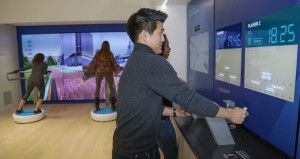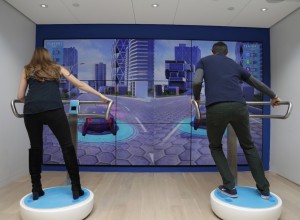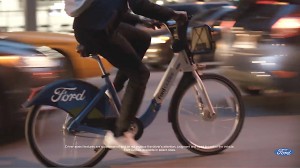Ford is earnestly trying to reshape its image as an automotive AND a mobility company and it’s taking to arguably the world’s biggest stage to keep up the image makeover momentum: the Super Bowl LI.
The Dearborn, Michigan-based automaker is using its part of its 90-second commercial during the match up between the Atlanta Falcons and New England Patriots to hype its mobility products.
Considering that 30-second spots go for more than $5 million, it’s hefty price to pay for something that still in the larval stage. It’s the company’s first Super Bowl ad since 2014 features a string of humorous footage of people getting stuck in life circumstances.
The maker also offers up potential solutions to some of life’s everyday transportation issues its ride-sharing, bike-sharing and autonomous vehicles to make life easier. It also allows for more information to be found at FordGoFurther.com.
Ford debuted the ad while also unveiling its new FordHub, which is an interactive space designed to show the public how Ford’s expansion to an auto and a mobility company is helping change the way the world moves.
FordHub is designed to inspire visitors – whether they own or intend to own a Ford vehicle or not – to think about the future of transportation in an entirely new way by encouraging imagination and dialogue.

The automaker opened its FordHub in New York City to give people a look at how technology Ford is using now and developing for the future will improve mobility.
“Ford was founded on the promise of providing affordable transportation solutions to millions of customers, and this commitment still drives us today,” said Stephen Odell, Ford executive vice president, Global Marketing, Sales and Service in a statement.
“As we expand our business to be both an auto and mobility company, we’re using new experiences like FordHub and our first Super Bowl ad that talks about the future to explain what we mean when we say ‘We Go Further so you can.’”
(Ford earnings dip 38% — to no surprise. Click Here for the story.)
The hub features a world map to see how near-term mobility advancements – including autonomous and electric vehicles, ride-sharing, ride-hailing and connected vehicles – will play a pivotal role in the City of Tomorrow.
FordHub also features a mobility map that tracks the pulse of New York City – with a dashboard of real-time traffic information for commuters, including trains, ferries and alerts.
Other experiences offer fun and intrigue. In the Last Mile Challenge, guests stand on wobbleboards and race through a futuristic world using every mode of transportation – from autonomous cars to e-bikes – earning tokens for each mobility decision they make. Still other experiences provide entertainment.
In Mustang over Manhattan, guests use a virtual reality headset to build a Mustang atop the Empire State Building, while their friends watch the build come together on a digital screen.
“Our first FordHub is a place designed to spark questions and curiosity,” said Elena Ford, Ford vice president, Global Dealer and Consumer Experience. “This isn’t a store or a dealer – it’s a place for participation and creativity. We want people to have fun while engaging in conversation about the future of transportation.”
(Detroit CEOs square off with new president over trade, regs, taxes. Click Here for the latest.)
Ford has been ramping up its “mobility” efforts both in terms of actual products and services as well as attempting to shape its image as a leader in all mods of personal transport.

In the Last Mile Challenge, guests stand on wobbleboards and race through a futuristic world using every mode of transportation – from autonomous cars to e-bikes.
Ford is “trying to stay ahead of what they see on the horizon,” AutoPacific analyst Dave Sullivan said in an email to USA Today. “They aren’t walking away from cars overnight. People will always need to get from A to B. How we do that will eventually change. Ford is hoping to be part of that in whatever form it takes the shape of.”
Ford has been demonstrating that those are more than just buzzwords with a series of actions in the last year, including buying into San Francisco-based shuttle service Chariot.
That’s one of a variety of different transportation projects Ford is investing in or setting up on its own through its Ford Mobility Initiative. It is exploring not only shuttle but ride-sharing services – including another San Francisco project involving bike sharing.
It is exploring ways to provide access to transportation to the hardcore unemployed in American inner cities, and means to deliver food and medical care to the impoverished in places like Gambia and South Africa.
Driving Ford is the recognition that the world of transportation is changing rapidly. Last fall, CEO Fields stressed that, “We believe the next decade will be defined by the development of autonomous vehicles.” Some industry observers believe that the emergence of self-driving cars could lead to a sharp decline in vehicle sales as motorists switch to increasingly affordable car-sharing services.
Fields is weaving the “mobility” portion into the business into its daily vernacular and assigning it “value”,” i.e. impact to the bottom line. For example, as Fields called the carmaker’s overall financial performance for 2016, “solid,” declaring in a statement that, after factoring in the one-time hit, Ford built on the all-time record earnings reported in 2016, he drew attention to the new focus.
“This underscores the substantial progress we are making in expanding our business to be an auto and a mobility company,” he said.
Fields last year said Ford would stop referring to itself as an automotive manufacturer, a shift meant to reflect its increasing focus on such things as ride- and car-sharing, as well as high-tech services and features.
(To see more about Ford teaming up with AutoFi, Click Here.)
The impact of that shift will likely not have much of a positive impact on Ford’s bottom line in the near-term, however, with car sales still the dominant factor. In fact, Ford on recently cautioned that adjusted pre-tax earnings in 2017 will likely dip as it increases investments in new technologies such as autonomous vehicles and electrified powertrains.

